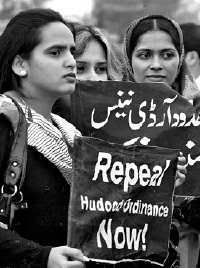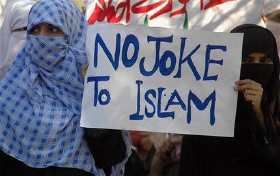 Women Protection Bill, 2006 (“WPB”) has finally passed, in an overwhelming majority vote, by the Pakistani Senate. MMA in a last attempt to make WPB ineffective suggested 17 amendments, which were all rejected by the Senators. Having already been cleared by the National Assembly, the only thing left, procedurally, for the bill to become law of the land is Presidential consent.
Women Protection Bill, 2006 (“WPB”) has finally passed, in an overwhelming majority vote, by the Pakistani Senate. MMA in a last attempt to make WPB ineffective suggested 17 amendments, which were all rejected by the Senators. Having already been cleared by the National Assembly, the only thing left, procedurally, for the bill to become law of the land is Presidential consent.
WPB is the first step towards changing the draconian rape and adultery laws, which were implemented by the President Zia-ul-Haq. The present Musharraf government has fought very hard to get these changes through and to make these amendments possible. This is not to suggest that these amendments are in anyway adequate or enough, however, they are the first step. WPB has been severely compromised by the pressure from MMA. They were some changes suggested by them, which have been incorporated in the Bil (text of changes available courtesy of eteraz.org). However, the entire text of the Bill still remains unavailable; therefore, it is very difficult to comment on the same with any certainty.
Ali Eteraz does offer some analysis on WPB and the issues with the same:
“Rape is now tried under the secular penal code, and the Sharia courts do not have jurisdiction over rape/rape-allegations.
This means that rape does not have to be proven by four witnesses (it can now be proven by circumstantial, even DNA evidence). The part on rape is the biggest victory of this bill. Rape has been totally separated from adultery or any other crimes of chastity.
Non-rape extra-and-pre-marital sex acts are still tried by the Sharia courts.
However, “lewdness” (a new offense which includes both adultery and pre-marital sex) will be tried by the secular courts.Yes, that means that two different court systems will have power over adultery and pre-marital sex: adultery/fornication matrix for Shariah courts; lewdness matrix for secular courts.
Those two courts systems will fight over it, and I have no idea how they determine who gets to try them. That is actually the million dollar question. My lawyer friend suggests that it is a judge which determines the jurisdiction. Question is: is that a Sharia judge or a secular judge?�
 The analysis further suggests that the matter would fall within the jurisdiction of Shariah court because of the Article 203D and 203DD (which describes the power of Shariah Court). This may not be necessarily true, and these questions of procedural and interpretation of law would only become clear with the passage of time and development of case law under the amended law.
The analysis further suggests that the matter would fall within the jurisdiction of Shariah court because of the Article 203D and 203DD (which describes the power of Shariah Court). This may not be necessarily true, and these questions of procedural and interpretation of law would only become clear with the passage of time and development of case law under the amended law.
However, it needs to be noted that most of the analysis is based on hearsay and is based on assertions and presumptions from other sources. Nonetheless, the analysis offered does deal with some of the legal and constitutional issues that may/will arise in respect of WPB. The limited text, which is available on Eteraz and the commentary in the newspapers all suggests that even at its best WPB, is extremely vague and there are various ambiguities and loopholes in the same. Any detailed and concrete analysis of legal issues would have to wait until the availability of the draft legislation.
 Nevertheless, it would not be wrong to say that the Presidential consent would not be the end of WPB both politically and legally. Politically there is the dilemma of threat by MMA of resigning from the National Assembly. Legally there are issues of constitutional law as well as procedural law attached with this legislation. In context of legal issues, this matter will only be conclusively decided either by the decision of the Supreme Court of Pakistan or by further amendments to the legislation.
Nevertheless, it would not be wrong to say that the Presidential consent would not be the end of WPB both politically and legally. Politically there is the dilemma of threat by MMA of resigning from the National Assembly. Legally there are issues of constitutional law as well as procedural law attached with this legislation. In context of legal issues, this matter will only be conclusively decided either by the decision of the Supreme Court of Pakistan or by further amendments to the legislation.
Umera Ali is a lawyer and blogs at Pointless Conundrum.



















































umera i am suprised at your analysis — there are some significant changes, particularly at the procedural level, that the legislation makes — perhaps the most important is that the police will not be able to arrest a rape victim or adultery accused unless directed by a sessions court — also, the sessions court can only summon an accused to attend a hearing or upon conviction — the greatest abuse of the Hudood ordinances used to take place at the police level —
adultery has been made a bailable offence also, unlike before — also anyone who falsely accuses someone else of committing a lewd act stands to be punished to five years in prison — i.e. the proof now rests with the complainant and not the defendant —
by any stretch of the imagination these are major and welcome changes — i am amazed that you being a lawyer missed these entirely —
also your conclusions are incorrect — the president has to sign the bill — i doubt it that the MMA’s resigning (that is if they do that in the first place) makes any difference because the bill has been passed by both houses of parliament — I also cannot see any legal challenge to the bill either except a referral to the Federal Shariat Court — but you should remember that all these nominees of the government
For those who still have not become victom of Media Propaganda of ‘bringing 4 evidences by a raped women’ and willing to learn truth about all controversary and prefers to extract truth from a propaganda rather rejecting something due to personal issues can make an unbais read of the article
written by author of hudood law Mr.Taqi Usmani.
Unfortunately it’s in urdu but since this law isrelated to Pakistanis who can read urdu so it shouldn’t be difficult for them to understand. Serious/willing to authentic sources non-urdu seekers could make an efforrt to get a translated copy could ask their peers to translate it into English.
P.S: Emphasis is added that who are being addressed to read the article.
P.P.S:Ms.Lawyer, Is it me or others also didn’t get reference of *orignal copy of new law* which you were demanding in other thread? Kindly make a reference of orignal text for those readers who don’t rely on *blogs material*.
It is useful to analyze the legal implications of this but let us remember that the real achievement here is political. The point of the bill is that these things CAN change. That is more important even than the change. Now that it has been amended it means that other amendments are possible. That is the political achievement.
Musharraf did an ‘address to the nation’ on this issue. The video is available on PakistanVision.com.
So, my question after reading this very useful analysis, is: are things better now with this ambiguity than they were with teh certainity of the earlier laws? Its a scary thought, but could this actually makes things worse rather than better?